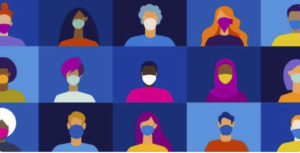
The enforced separations of the pandemic have brought a particular kind of mourning to many grandparents.
-
Kathy Koehler had made elaborate plans to meet her first grandchild. Her daughter, who was expecting a baby last March, lived in London, and Ms. Koehler intended to fly there from her home in Ann Arbor, Mich.She had collected a small stash of blankets, toys and clothes to tuck into her suitcase, and reserved a bed-and-breakfast near her daughter’s flat for the month of April.
“I’d be there every day and help out and get to know this little guy,” said Ms. Koehler, who’s 63. “I could not wait.”
That trip never took place, of course. Nor did her daughter make a planned visit home in October to introduce her new son, Elya, to the rest of the family. Covid-19 intervened. Crushed, Ms. Koehler hoped she could at least celebrate her grandson’s first birthday in person. Friends scoffed at her pessimism, assuring her that surely international travel would safely resume before then. But Elya turns 1 on March 13, and his maternal grandmother has yet to hold or kiss him.
“It feels like a double loss,” she said. “I’m losing time with this newborn that I’ll never get back. And I didn’t get to see my daughter and son-in-law fall in love with him and become parents. I felt so cheated.”The enforced separations of the pandemic have caused widespread sorrow for grandparents. Whether they live an ocean apart or around the corner, many have had to cancel visits, forgo holiday gatherings and give up the ordinary pleasures of reading stories and playing games. Even though distancing protects grandparents’ physical health and safety, because elders are at higher risk, it has been a painful time. And it’s not entirely behind us. The vaccine rollout may prompt a spate of joyful reunions in coming weeks; new guidelines from the Centers for Disease Control and Prevention say that fully vaccinated grandparents can now safely visit with grandchildren. But, in many states, older people are still scrambling for appointments and the C.D.C. has maintained its warnings against travel. Ms. Koehler, who doesn’t yet qualify for vaccination in Michigan, will watch Elya’s birthday party via Zoom.
Long before the pandemic, researchers knew that social isolation afflicted many older adults. In widely cited studies, about a quarter reported feeling isolated and more than 40 percent felt lonely, states that can affect both psychological and physical health. For many people, the pandemic intensified that sense of disconnection.
The inability to spend time with grandchildren brings a particular kind of loss, however. Children change more quickly than our other relatives. As Ms. Koehler pointed out, missing time with babies means they have passed through phases and stages we will never witness, except on video screens. Grandparents were unable to attend many older kids’ milestones, too, over the last year — dance recitals, soccer games, graduations. Some special occasions did not take place at all.
Nor could they help their beleaguered children the way many wished to, as they faced uncommon economic and other pressures, often without child care or in-person school.
Kerry Byrne, the founder of The Long Distance Grandparent, a business that helps build intergenerational connections, heard from distressed grandparents all year. After extended apartness, “they worry that the grandchildren won’t know you or you won’t know them,” she said. “They worry they won’t be able to maintain these bonds.”
Risa Nye, 69, a writer in Oakland, was able to see her four grandchildren in the Bay Area, though in some cases only outdoors. But what about the two in Syracuse, N.Y.?
Prepandemic, Ms. Nye and her husband would fly east or her daughter and family would come west several times a year. Sometimes they’d vacation together at the Jersey Shore or in Southern California near Disneyland.
Now, she wonders if Madeleine, 13, and Ezra, 7, will remember eating blue pancakes at the Rise N Shine Diner or seeing “Wonder Woman” together. “It’s been a year-plus,” Ms. Nye said. “The older one’s a teenager. I’m missing out.” This has been devastating,” agreed her daughter, Caitlin Nye, 43. Her parents hinted about visiting, and “it’s very hard to tell your mom, ‘There’s no logistical way to do this safely and without huge anxiety.’” But as a nurse educator hyper-aware of viral risks, that is what she told her mother. Grandparent grief — a term used by Emma Payne, founder of a company called Grief Coach — involves another dimension: older people recognize that time with their families is growing limited. The average age for becoming a grandparent in the United States is 50, but many grandparents are older or face health problems.
A year apart can feel more wrenching to a 75-year-old, for whom it represents a greater proportion of her remaining life span, than to her 35-year-old son or daughter.
Marilee Reinertson Torres, 61, has five grandchildren within a half-hour drive of her home in Cedar Rapids, Iowa. Last April, she greeted the youngest, Salma Elaine, from outside the window of the hospital where she’d just been born. Though Ms. Torres could see her grandchildren outdoors over the summer, and hold the newcomer, those visits stopped in the November cold.
Because she undergoes chemotherapy infusions and scans every three weeks for a recurrence of cervical cancer, Ms. Torres said she is more aware of mortality than other people. “I saw Salma when she was born. Can I see her go to school? I want to see what my 10-year-old is like as an adult.” She questions whether she will.
Experts in child development are reassuring on one score: Family bonds can weather this interruption.

“Grandparents shouldn’t worry that they won’t have important roles in their grandchildren’s lives going forward,” said Dr. Dimitri Christakis, who directs the Center for Child Health, Behavior and Development at Seattle Children’s Research Institute.
“Children are resilient and they’re highly adaptable,” he said. “If a child is being reintroduced to grandparents after a year apart, they will still have a very important place in that child’s life.”
Maintaining those connections, especially with children who didn’t know their grandparents well before Covid-19, does take effort, however.
Ms. Koehler has Skyped with Elya and his mother every day. “He absolutely knows my face,” she said. She and her husband show him their dog and cats and play where’s-your-nose together. “It feels like a real relationship is being formed,” said Ms. Koehler, who also Skypes with a second grandchild in Maine.
Kathryn Hirsh-Pasek, a psychologist at Temple University, Zooms nightly with her own young grandchildren. “If there are ways that allow you to see a face or hear a voice, that can be very powerful in maintaining relationships,” she said.
“A willingness to be silly and playful is important,” Ms. Byrne added. Oh, I know.
I haven’t been separated from my granddaughter, now 4; she and her parents and I have formed a pandemic pod. We mask and distance from everyone else, but not from one another.
Since I’m lucky enough to remain her child care provider one day a week, we don’t need to FaceTime often. But when we do, I pull out the hand puppets and have been known to get cheap laughs by bonking a pesky horse puppet on the head with a banana.
But no matter how hard all parties have worked at staying in touch, many grandparents have suffered deeply this year. Resumed visits — the real kind, in person — cannot come too soon.
“Grief” isn’t too strong a word for those grandparents who have yearned all year for a small hand in theirs, for a hug without fear.



